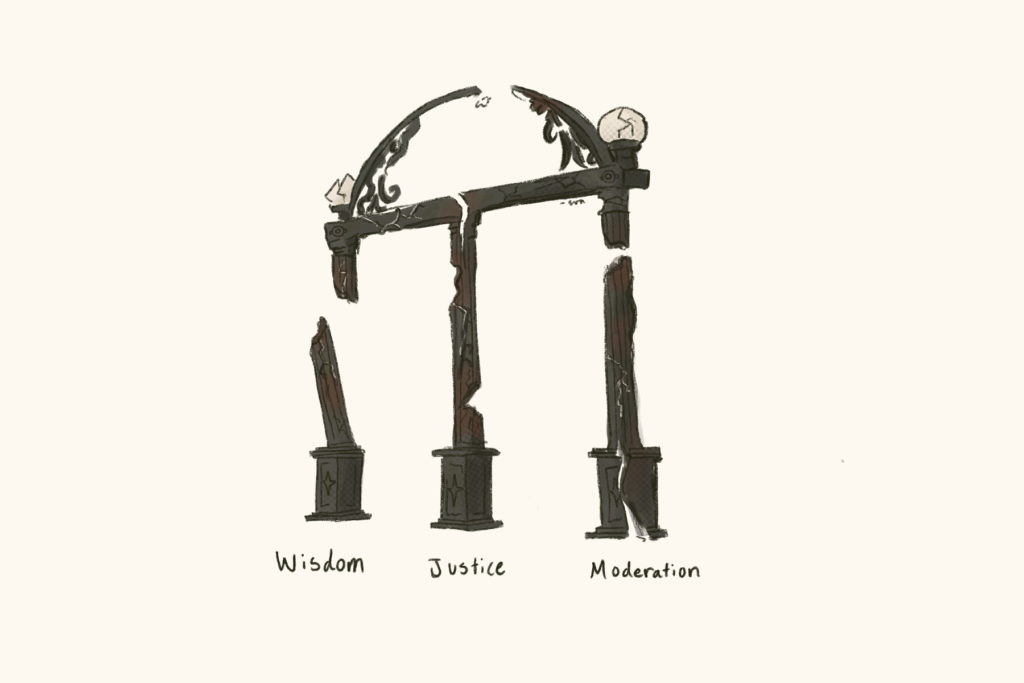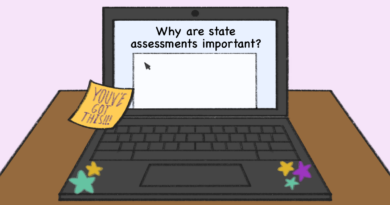
Unwise, unjust and immoderate
Sanford Stadium is sold out for the University of Georgia’s matchup against the University of Alabama-Birmingham on Saturday. On the 20th anniversary of 9/11, 92,746 fans will pour through the entrances excited, sweaty, sometimes intoxicated, and the air they breathe will carry a delta-ridden sea of microdroplets.
This football game and those to follow will increase the spread of coronavirus, undoubtedly resulting in deaths. No tradition, no local economic growth, no student and alumni pushback is worth the damage being inflicted on the Athens community by the UGA administration’s already insufficient COVID-19 policies while hosting football games at full stadium capacity with no social distancing, masking or vaccination requirements. This football season is yet another component of the University’s overall handling of the pandemic that flies in the face of the three pillars of the arch: wisdom, justice and moderation.
As a dual enrollment student I attend UGA classes in the mornings and return to Cedar Shoals High School for afternoon classes. I walk into morning classes with at least one third unmasked students, and a soundtrack of coughs from the masked and unmasked alike serenades me. Then I make my way back to Cedar Shoals where masks are required and worn dutifully. Until this week, that is, when Clarke County high schools moved to an online learning environment Tuesday partly in response to growing COVID-19 cases throughout Athens.
On Tuesday morning before I logged on to Zoom for my high school classes, a student in my geography class at UGA opened up her computer to display an “I love Athens” sticker as she sat maskless in the front row, ironically embodying the injustice of UGA’s COVID-19 policies, or lack thereof. Beyond the choices of individuals though, University administration and the Board of Regents of the University System of Georgia are ultimately responsible for masks going out of style on campuses as they bend to political agendas and economic pressure in the name of individual freedom.
As students enjoy their freedom to work and play uninhibited by safe practices, the University staff and Athens community lose more of their freedom. Thousands of wage workers on and off campus have no choice but to work in crowded, indoor or generally unsafe settings that become more dangerous everyday. Then when these workers or anyone in the greater Athens area get sick (COVID-19 or not), they are less and less likely to find a bed and the necessary staff to treat them in local hospitals. Additionally, students who rely on the in-person instruction, social interaction and free lunches that school provides gradually lose the potential freedom that education creates. The pandemic and the University’s response demonstrate how the supposedly symbiotic relationship between UGA and Athens only furthers inequality and injustice.
With 681 new cases, — a number that might be a gross underestimate considering the 12.62% positivity rate — 134 new COVID-19 hospital admissions, and four deaths in the past seven days, spread of the virus in Athens-Clarke County is only getting worse. Allowing a mass gathering of this scale without requiring proof of vaccination, masks or even social distancing is beyond unwise.
Further, only 44% of the Athens-Clarke County population is fully vaccinated, 14% are uninsured and 31.3% live in poverty. Local hospitals that provide care for ACC and the surrounding nine counties are overwhelmed: beds are filled at rates that match or exceed the peaks of Aug. 2020 and Jan. 2021. The University is not wholly responsible for community spread, but the Athens-specific factors above combine with carelessness across the University to exacerbate spread tragically.
Besides the tens of thousands of alumni and fans from UGA and visiting teams, Athens sustained the influx of 30,000 students as classes began in August. There is no mask mandate or vaccine requirement, and instead professors are threatened with disciplinary action for requiring masks in class or moving instruction to a virtual platform. Cases at the University have risen steadily since classes began, with 505 new positive cases over the week of Aug. 30 through Sept. 5.
In the past 30 days, there have been 533 new confirmed cases among Clarke County School District students and staff. At Cedar Shoals High School, 31 students and staff have tested positive in the last two weeks.
Local high school nurses work through days and evenings to manage everyday operations at their schools on top of contact tracing to combat the steady rise in cases across the county. There is no on-site testing at CCSD schools to conduct surveillance testing or local testing appointments, and rapid tests are scarce. Exhaustive testing, contact tracing and preventative quarantining is nearly impossible as cases spread too fast for us to keep up.
UGA’s pillar of wisdom requires common sense mitigation policies. Fellow SEC school Louisiana State University is requiring proof of vaccination or a negative COVID-19 test from the past 72 hours for fans to attend games. In addition to requiring proof of vaccination, Tulane University and all Oregon universities require face coverings in their stadiums at all times.
Since the Centers for Disease Control and Prevention recommended even fully vaccinated people wear masks indoors, hundreds of universities have imposed mask mandates. At the very least UGA should mandate masks and match the roughly 680 U.S. universities that require students to get vaccinated.
Tomorrow the nearly 3,000 people who died in the 9/11 attacks 20 years ago will probably be memorialized in a moment of silence or a fly-over. I hope their lives will be remembered for decades to come, but I also hope we remember the 652,480 lives lost to COVID-19 in the United States alone by preventing further losses.
The University is not solely responsible for the extent of spread we see today and it will not be the solution to this surge, but moderation in the form of limiting stadium capacity, requiring masks on campus and enforcing social distancing is crucial for the community’s recovery and long-term well-being.



